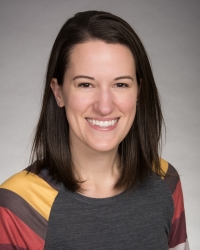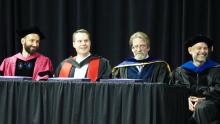Robinson Promoted to Associate Teaching Professor; Michael Promoted to Professor
We are pleased to announce that Assistant Teaching Professor Samantha Robinson has been promoted to associate teaching professor and Associate Professor Forrest Michael has been promoted to professor. These promotions are effective September 16, 2023.
Samantha Robinson
Associate Teaching Professor

Samantha Robinson received a B.S. in chemistry from the University of Iowa and the Ph.D. in chemistry from the University of Washington, where she studied inorganic synthesis with Prof. D. Michael Heinekey. Following a year of postdoctoral research at the Institute for Integrated Catalysis at Pacific Northwest National Laboratory, Robinson joined the faculty at Seattle Pacific University. As an assistant professor, Robinson led a group of undergraduate researchers and taught lecture and laboratory courses in general chemistry and upper-division inorganic chemistry. Research in the Robinson group focused on inorganic synthesis projects related to electrochemical cycles for manipulating carbon dioxide in the presence of acids and hydride equivalents. Robinson’s teaching contributions included significant curriculum and course development.
At the University of Washington, Robinson teaches introductory-level courses in general and organic chemistry. Since 2021, she has worked with Teaching Professor Colleen Craig on the Catalyze Your Success program, developing course activities and online resources to encourage effective metacognition and implementation of practical learning strategies by university chemistry students. While this program was originally funded during the return to campus following COVID-19 remote instruction, they received approval for ongoing collection of data regarding student course engagement, attitudes toward chemistry courses, outcomes of Catalyze Your Success program assignments, and their impact on overall student learning.
Robinson has served as both a member and, since 2022, as a co-chair of the UW Faculty Council for Gender Equity, and Justice. She will chair the Department of Chemistry’s Diversity and Equity Steering Committee in Academic Year 2023-24, which she joined as a member in 2022. Her other service activities in the department have included the Committee for Remote Teaching & Learning, various curriculum committees, co-organizing Chemistry Education Group Seminars, and organizing or presenting at orientation for our graduate teaching assistants.
To learn more about Professor Robinson and her work, please visit her faculty page, the Chemistry Education page, or contact her directly.
Forrest Michael
Professor

Forrest Michael obtained the Ph.D. in the laboratory of Prof. David Evans at Harvard University in 2001 where he explored the design and development of new chiral ligands for enantioselective catalysis. He then studied as a NIH postdoctoral fellow with Prof. Robert Bergman at the University of California, Berkeley. During this time, Michael performed fundamental mechanistic studies of zirconium-based catalysts for alkene functionalization. Forrest joined the faculty at the University of Washington in 2004, where he has since developed a program devoted to understanding the fundamental mechanisms of organic and organometallic reactions and applying those mechanisms to the development of new catalytic methods for the construction of organic compounds. The Michael group uses the tools of physical organic chemistry to understand unusual reactivity and modes of selectivity. Simultaneously, they use the mechanistic information gleaned from such studies to design new catalytic reactions that address unsolved problems in C-N and C-C bond formation.
Current areas of interest in the Michael group include:
- Developing strategies to control and inhibit beta-hydride elimination in transition metal complexes, with a particular focus on C-N bond forming reactions.
- Understanding the principles behind successful stereocontrol in enantioselective reactions.
- Harnessing hypervalent main group chemistry—e.g., iodine(III), selenium(IV)—to activate and functionalize C-C multiple bonds.
- New strategies for the selective activation of C-H bonds.
To learn more about Professor Michael and his research, please visit his faculty page, research group website, or contact him directly.